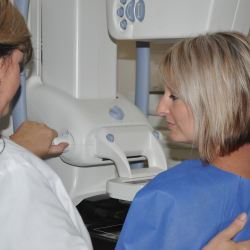A new, large-scale breast cancer study of women who had not yet reached menopause produced a surprising result: as body fat increased, their cancer risk decreased.
The finding runs directly counter to what we know about breast cancer risk in postmenopausal women, where the risk increases as a woman's body mass index, or BMI, climbs.
But for younger women it was the opposite: "We saw a trend where, as BMI went up, cancer risk went down," said Hazel Nichols, PhD, a researcher at the University of North Carolina Lineberger Comprehensive Cancer Center, who co-led the study. "There was no threshold at which having a higher BMI was linked to lower cancer risk."
Dr. Nichols and her team collected and analyzed data from 19 different studies that encompassed nearly 760,000 women younger than age 55. Researchers determined an inverse weight-risk relationship for those in this group.
"The largest reductions in risk were for BMI between the ages of 18 and 24, with a 23 percent lower breast cancer risk linked to each five-unit increase in BMI during this time period," UNC said in a written statement. "At ages 25 to 34, each five-unit increase in BMI was linked to 15 percent lower risk. There was a 13 percent lower risk for BMI at ages 35 to 44, and a 12 percent lower risk for BMI at ages 45 to 54 years.
The findings were recently published in the journal JAMA Oncology.
 Older women are more likely to be stricken with breast cancer, and it's been determined that obesity and weight gain for women after menopause elevates risk. In the U.S. the median age to be diagnosed with breast cancer is 62.
Older women are more likely to be stricken with breast cancer, and it's been determined that obesity and weight gain for women after menopause elevates risk. In the U.S. the median age to be diagnosed with breast cancer is 62.
Dr. Nichols warned that younger women should not take these findings as encouragement to gain weight as a protective measure.
"This study is not a reason to try to gain weight to prevent breast cancer," she stated. "Heavier women have a lower overall risk of breast cancer before menopause, but there are a lot of other benefits to managing a healthy weight that should be considered. What it does do is help us to try to understand what contributes to breast cancer risk in younger women."
Theorizing about the connection, Dr. Nichols says several factors could be contributing to the link: breast density, or hormone differences – including estrogen – where premenopausal levels are different from those measured after menopause occurs.

